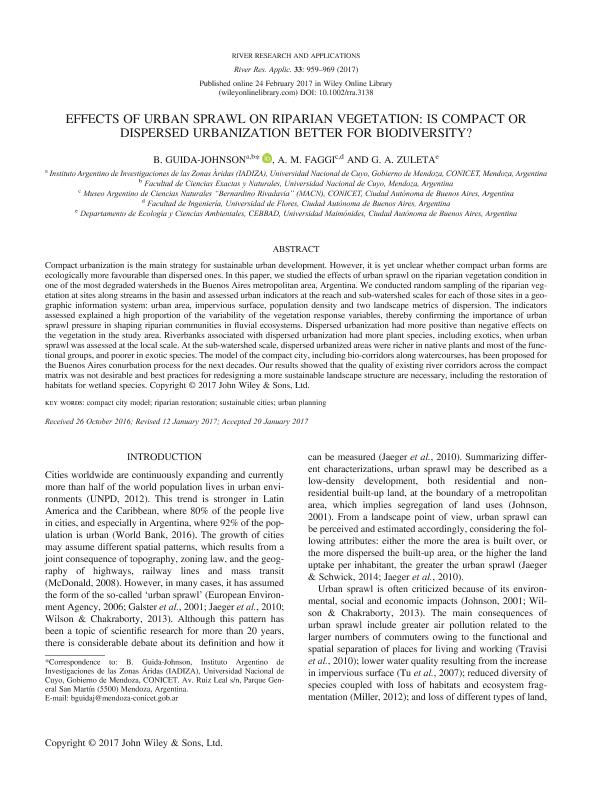Artículo
Effects of Urban Sprawl on Riparian Vegetation: Is Compact or Dispersed Urbanization Better for Biodiversity?
Fecha de publicación:
24/07/2017
Editorial:
John Wiley & Sons Ltd
Revista:
River Research And Applications
ISSN:
1535-1459
Idioma:
Inglés
Tipo de recurso:
Artículo publicado
Clasificación temática:
Resumen
Compact urbanization is the main strategy for sustainable urban development. However, it is yet unclear whether compact urban forms are ecologically more favourable than dispersed ones. In this paper, we studied the effects of urban sprawl on the riparian vegetation condition in one of the most degraded watersheds in the Buenos Aires metropolitan area, Argentina. We conducted random sampling of the riparian vegetation at sites along streams in the basin and assessed urban indicators at the reach and sub-watershed scales for each of those sites in a geographic information system: urban area, impervious surface, population density and two landscape metrics of dispersion. The indicators assessed explained a high proportion of the variability of the vegetation response variables, thereby confirming the importance of urban sprawl pressure in shaping riparian communities in fluvial ecosystems. Dispersed urbanization had more positive than negative effects on the vegetation in the study area. Riverbanks associated with dispersed urbanization had more plant species, including exotics, when urban sprawl was assessed at the local scale. At the sub-watershed scale, dispersed urbanized areas were richer in native plants and most of the functional groups, and poorer in exotic species. The model of the compact city, including bio-corridors along watercourses, has been proposed for the Buenos Aires conurbation process for the next decades. Our results showed that the quality of existing river corridors across the compact matrix was not desirable and best practices for redesigning a more sustainable landscape structure are necessary, including the restoration of habitats for wetland species.
Palabras clave:
Compact City Model
,
Riparian Restoration
,
Sustainable Cities
,
Urban Planning
Archivos asociados
Licencia
Identificadores
Colecciones
Articulos(IADIZA)
Articulos de INST. ARG DE INVEST. DE LAS ZONAS ARIDAS
Articulos de INST. ARG DE INVEST. DE LAS ZONAS ARIDAS
Citación
Guida Johnson, Bárbara; Faggi, Ana Maria; Zuleta, Gustavo Adolfo; Effects of Urban Sprawl on Riparian Vegetation: Is Compact or Dispersed Urbanization Better for Biodiversity?; John Wiley & Sons Ltd; River Research And Applications; 33; 6; 24-7-2017; 959-969
Compartir
Altmétricas




